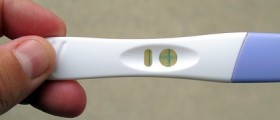
Menstrual period is a characteristic of a woman who can bear children. It is a time when she is fulfilled as a woman, and a time when she creates a family, and it would all be great if it weren’t followed by discomforting symptoms, both physical and psychological. We will name the most frequent ones. According to researches, nearly 80% of women around the world experience menstrual discomforts, and the reason for that lies in our body. It is well known that woman’s ovaries release one egg once a month, and that egg is waiting to be fertilized. As it is not fertilized it is expelled from the uterus with tissue lining that was prepared for welcoming the fetus. Every time when an egg is not fertilized it is discharged along with that lining as a menstrual flow. All of this (egg, tissue and blood) that comes out of a vagina results in discomfort.
Pain experienced by women before menstrual period is called PMS or Pre-Menstrual-Syndrome. Pain in the abdomen as a symptom of a menstrual period is the most common one. Discomfort starts a couple of days before a menstrual flow. Other symptoms are attributed to an imaginative pain, but recent studies established that that pain has physical ground and the main culprit is hormone. It is a time when the hormone level in woman’s body is fluctuating. Another discomfort during menstrual period is related to menstrual cramps occurring because the uterus is contracting, so that a lining is shed. Prostaglandin is a hormone responsible for the muscle contractions. When a period of 14 days pass the body is prepared to release another egg, hormones (estrogen and progesterone) are balanced again and keep increasing until the fourth day before it is time for a next period. If fertilization does not occur the level of hormones suddenly drops resulting in another menstrual flow.
The symptom of bloating happens one week before the menstrual flow. Other symptoms such as breast tenderness and swelling around the joints, and insomnia occur, but these symptoms are not the same in every woman. Some women may not experience those symptoms at all, and some may lie for days in cramps and pain. It is all individual. Some changes in their behavior can be noticed and attacks of anxiety and social withdrawal are the most common. A very strong pain in the region of abdomen is called dysmenorrhea. But on the other hand every woman should be thankful for this wonder of her body to bring a new life into this world and that is something that should be appreciated.
















Your thoughts on this
Loading...